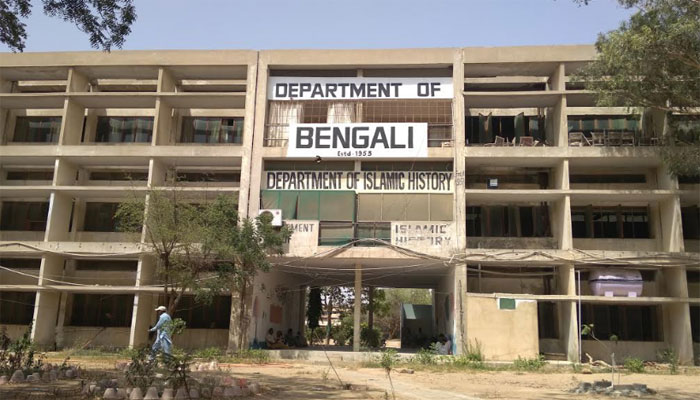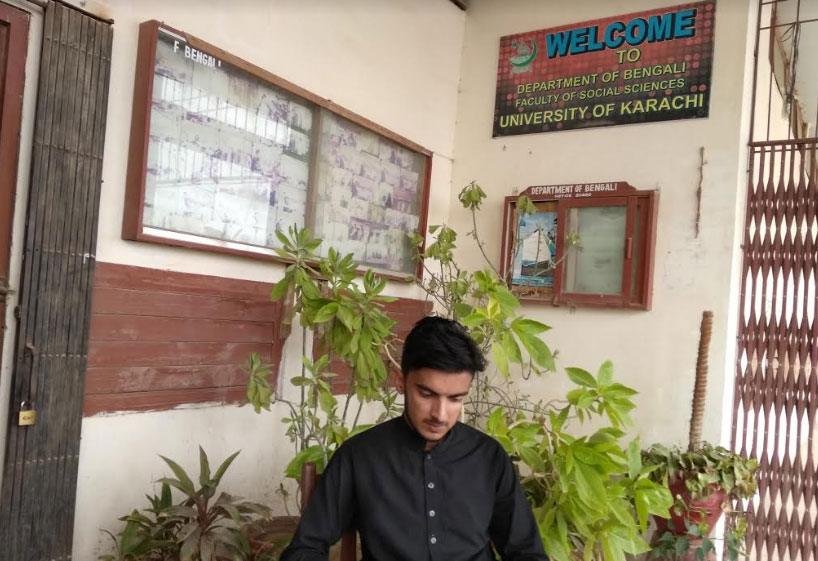KU continues its Bengali department with six students despite many Bengalis in city
Prof Dr Mohammad Abu Tayyub Khan, 65, struggles to keep the Department of Bengali at the University of Karachi (KU) functioning. Being the only faculty member at the department, Prof Abu Tayyub comes early in the morning and sits at his small office.
Near the door of his office, some earthenware vases are placed in which various plants have been grown, which are a sign of some life there. Whereas the department might have undergone various changes over the years, what has remained unchanged is the professor’s routine who has been attending his office for almost two decades.
To his next door is situated the entire Bengali department, which comprises a single classroom and a small library where hundreds of books — mostly of Bengali literature — have been placed in three dusty bookcases. It seems those books have rarely been read – at least recently – as many of their covers have a thick layer of dust on them.
Upon entering the library, the deserted look of the place immediately makes one realise that the books are in desperate need of a librarian. For the past many years, the varsity has appointed no librarian there. A female clerk and a peon, who sometimes assist Prof Abu Tayyub, have, however, placed their chairs in the library.
Number of students
Established back in 1953, the Bengali department is currently the smallest department of the KU in terms of both the employment and the student-faculty ratio. However, it is still functional as it offers admissions for programmes from the bachelor’s degree to the PhD level.
Though the KU management claims to equally promote all the departments, the Department of Bengali is almost a forgotten chapter owing to its extremely low enrolment. At present, only six students are enrolled at the department in the undergraduate and postgraduate programmes.
Of the six students, two, Hassan Muhammad Umar and Yasmeen Siraj, are enrolled on the MS previous programme, whereas, the other four are the students of BS programme, of whom three students, Shezad Siraj, Jameel Ahmed and Areeb Ahmed, are in their second year. A single student, Muhammad Furqan, was enrolled at the department this year who is in his first year of BS.
Among the six students, Shezad and Yasmeen are siblings and Bengalis. In the remaining lot, Jameel is Sindhi and others are Urdu-speaking. Despite its low enrolment, the Bengali department offers around 80 seats in its BS and MS programmes every year when the admission process at the KU starts. The department also announces five seats for PhD candidates as the Higher Education Commission of Pakistan has allowed one faculty member to supervise five PhD candidates.
Low enrolment’s reasons
Commenting on the low admissions at the department, Prof Abu Tayyub remarked that people had an impression that getting a degree in Bengali would not help them acquire jobs.
“These days, new entrants seek admissions in job-oriented programmes and they rarely opt to learn languages. Thus, many applications for admissions for learning Bengali can’t be expected, that too from those students whose mother tongue is completely different,” he said.
He added that Bengalis living in Karachi were mostly underprivileged and uneducated who also did not have legal documents such as domiciles and permanent residence certificates that made it impossible for them to get admissions to varsities and degree awarding institutions.
Despite the fact that no comprehensive information is available about the number of Bengalis in Karachi, Pakistan Muslim League Sher-e-Bangal (PML-SB) President Dr Muhammad Alauddin claims that the Pakistan Bureau of Statistics has counted more than 1.6 million Bengalis in Karachi. He further claims that as many as 1.4 million unregistered Bengalis are also residing in various slums of the city.
Speaking about the general level of education in Bengali families, Alauddin said Bengalis have no access to education even on the primary level which rendered them unable to acquire higher education.
“In the early 1960s until the late 70s, everyone would have wished to get admission to the Department of Bengali at Karachi University. However, the recent identification crisis has incurably demoralised the Bengali community,” he said.
Renowned academics
According to the introductory brochure of the department, the KU established the Department of Bengali soon after it was founded in order to bring the people of East Pakistan and West Pakistan closer.
Prof Syed Ali Ahsan was a notable academic who made invaluable contributions for the department’s development. Unfortunately, he left West Pakistan after the fall of Dhaka, after which he served at many varsities in Bangladesh, including the Jahangir Nagar University and the University of Rajshahi. He also became the vice chancellor of the Chittagong University and held the office of the University Grants Commission of Bangladesh (UGC) chairman as well.
Prof Muhammad Farooq was the second head of the KU Department of Bengali. After leaving Pakistan in 1971, he was hired as a faculty member at the Bengali department in the Jahangir Nagar University.
Prof Syed Ashraf Ali was the third head of the department. During his era, the post of the department head was officially named chairman. He also headed the Department of English in KU until 1973.
Following other Bengali academics, Prof Ashraf Ali also eventually left Pakistan. He afterwards became the director general of the World Centre for Islamic Education in Jeddah. In 1989, he founded Darul Ihsan University in Dhaka.
As the Bengali scholars started leaving the KU after the fall of Dhaka, the future of the Bengali department became uncertain. However, a retired college professor, Abdul Ghafoor, then played a crucial role in reviving the department where he served between 1973 and 1989.
After Prof Ghafoor, the department was headed by Mohiuddin Chaudhary who held his post from 1989 to 2002. Since then, Prof Abu Tayyub, who earned his PhD from the same department under the supervision of Prof Dr Humayun Khan, looks after the department where he is the sole faculty member.
Students’ views
The News had the opportunity to interview some students of the department who were learning Bengali as a foreign language.
Interestingly, they were well aware that they would not find many job opportunities after graduation. “I’m a mechanical engineer and already serving at a private firm. Thus, in studying Bengali, my aim is not to get a job. I just have passion to learn other languages like Chinese, Bengali, Persian and Pashto,” said MS student Umar.
Another student, Jameel, had a different viewpoint. “By studying Bengali, one can explore more about Bangladesh and its culture, history and geography. I don’t think that the students who study Bengali would have less job opportunities. I would like to become a teacher of Bengali language as the city has a large Bengali population but there is no one to teach them,” he said.
-
 Timothee Chalamet Admits To Being Inspired By Matthew McConaughey's Performance In 'Interstellar'
Timothee Chalamet Admits To Being Inspired By Matthew McConaughey's Performance In 'Interstellar' -
 'Determined' Savannah Guthrie Plans To Honour Her Mother Nancy With Major Move: 'It's Going To Be Emotional'
'Determined' Savannah Guthrie Plans To Honour Her Mother Nancy With Major Move: 'It's Going To Be Emotional' -
 Train's Pat Monahan Blows The Lid On 'emotional' Tale Attached To Hit Song 'Drops Of Jupiter'
Train's Pat Monahan Blows The Lid On 'emotional' Tale Attached To Hit Song 'Drops Of Jupiter' -
 Kurt Russell Spills The Beans On His Plans For Milestone Birthday This Year: 'Looking Forward To It'
Kurt Russell Spills The Beans On His Plans For Milestone Birthday This Year: 'Looking Forward To It' -
 PayPal Data Breach Exposed Sensitive User Data For Six-month Period; What You Need To Know
PayPal Data Breach Exposed Sensitive User Data For Six-month Period; What You Need To Know -
 Prince William Receives First Heartbreaking News After Andrew Arrest
Prince William Receives First Heartbreaking News After Andrew Arrest -
 11-year-old Allegedly Kills Father Over Confiscated Nintendo Switch
11-year-old Allegedly Kills Father Over Confiscated Nintendo Switch -
 Jacob Elordi Talks About Filming Steamy Scenes With Margot Robbie In 'Wuthering Heights'
Jacob Elordi Talks About Filming Steamy Scenes With Margot Robbie In 'Wuthering Heights' -
 Why Prince Harry Really Wants To Reconcile With King Charles, Prince William, Kate Middleton?
Why Prince Harry Really Wants To Reconcile With King Charles, Prince William, Kate Middleton? -
 'Grief Is Cruel': Kelly Osbourne Offers Glimpse Into Hidden Pain Over Rockstar Father Ozzy Death
'Grief Is Cruel': Kelly Osbourne Offers Glimpse Into Hidden Pain Over Rockstar Father Ozzy Death -
 Timothée Chalamet Reveals Rare Impact Of Not Attending Acting School On Career
Timothée Chalamet Reveals Rare Impact Of Not Attending Acting School On Career -
 Liza Minnelli Gets Candid About Her Struggles With Substance Abuse Post Death Of Mum Judy Garland
Liza Minnelli Gets Candid About Her Struggles With Substance Abuse Post Death Of Mum Judy Garland -
 'Saturday Night Live' Star Will Forte Reveals How He Feels About Returning To The Show After 2010 Exit
'Saturday Night Live' Star Will Forte Reveals How He Feels About Returning To The Show After 2010 Exit -
 Police Officer Arrested Over Alleged Assault Hours After Oath-taking
Police Officer Arrested Over Alleged Assault Hours After Oath-taking -
 Maxwell Seeks To Block Further Release Of Epstein Files, Calls Law ‘unconstitutional’
Maxwell Seeks To Block Further Release Of Epstein Files, Calls Law ‘unconstitutional’ -
 Prince William Issues 'ultimatum' To Queen Camilla As Monarchy Is In 'delicate Phase'
Prince William Issues 'ultimatum' To Queen Camilla As Monarchy Is In 'delicate Phase'





